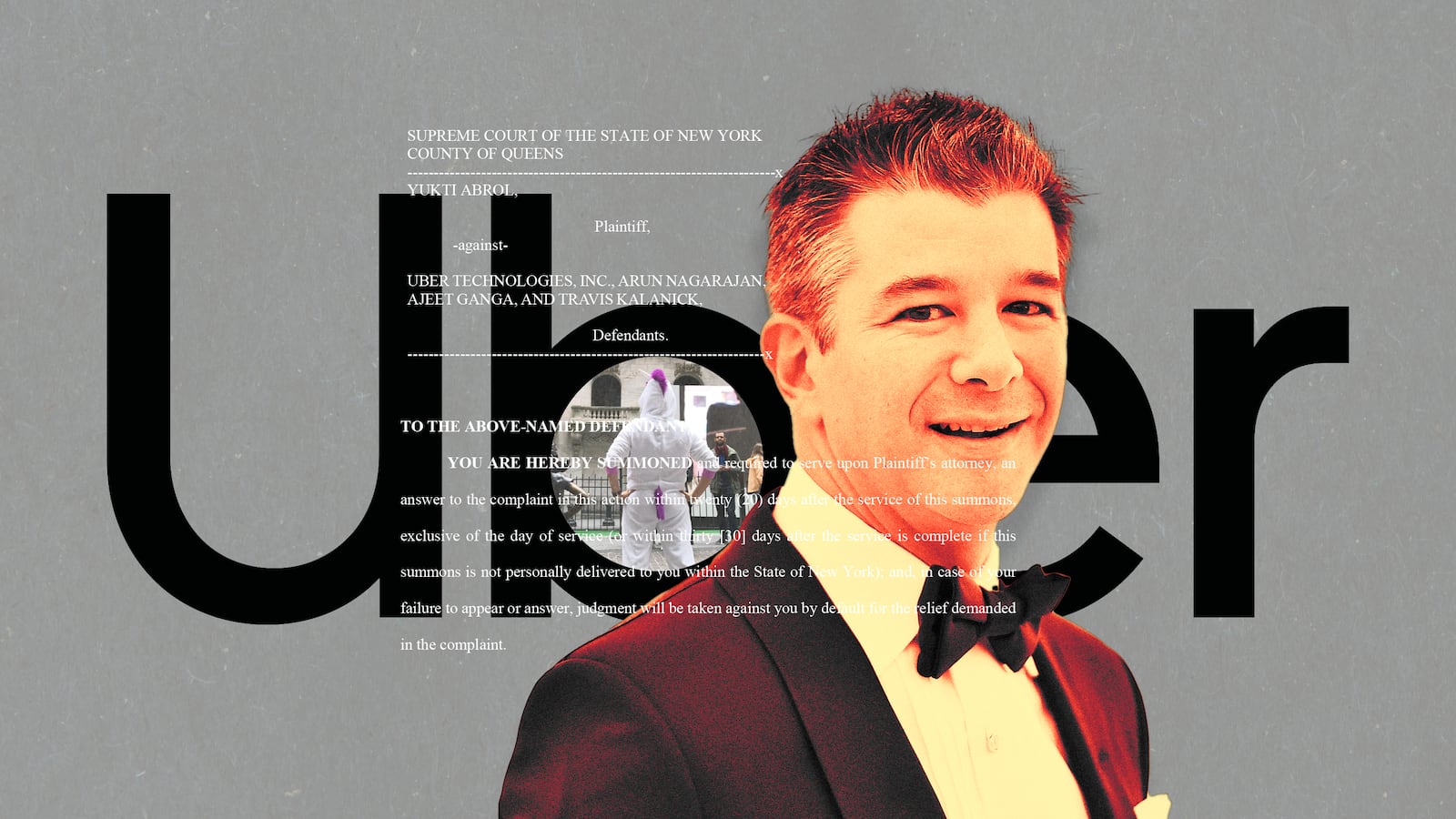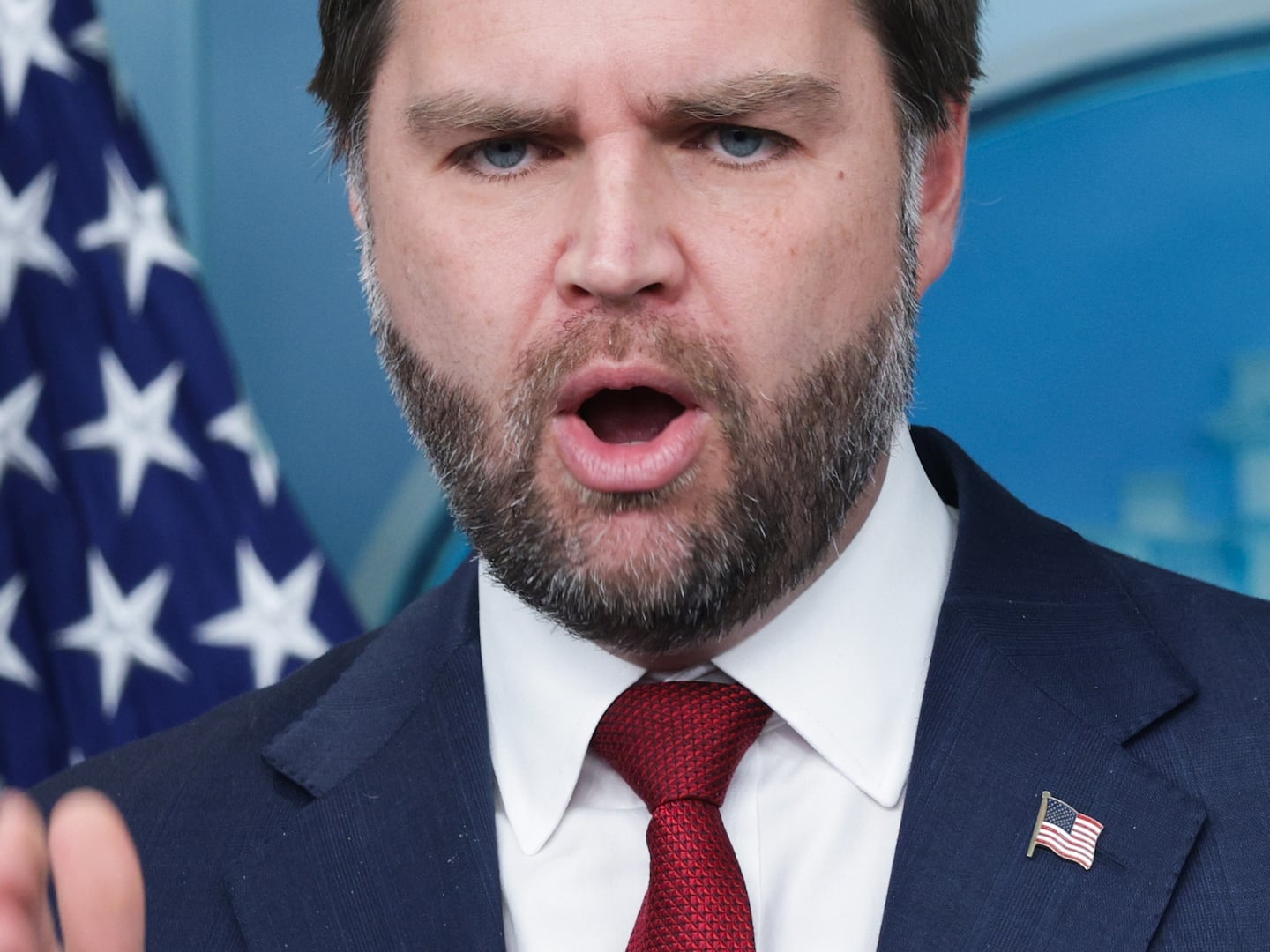A New York City software engineer is suing former Uber CEO Travis Kalanick over claims that he publicly degraded her at a company-wide party to commemorate the firm’s hotly anticipated IPO, leaving her mortified before a room filled with colleagues and top executives.
Yukti Abrol says she wore a unicorn costume to the May 9, 2019, bash at an Irish pub in Manhattan as a fun way to celebrate Uber’s status as a so-called “unicorn” valued at $1 billion or more. Abrol says the festivities were in full swing when she walked in and Kalanick, who had already been pushed out of Uber following a plethora of ugly sexual harassment allegations against numerous corporate staffers, noticed her outfit.
“To [Abrol’s] horror, as she entered the bar… Kalanick approached her and, without warning, grabbed the horn on her costume, made a masturbatory motion on it, smirked at her, and then walked away,” according to a lawsuit obtained by The Daily Beast. “[Abrol] felt humiliated and disgusted. As she looked around, she saw her team members looking at her with shock and concern. Several of her colleagues approached her to ask her if she was okay and express their disgust with… Kalanick.”
An attorney for Kalanick vehemently denied the allegation in an email on Monday, telling The Daily Beast, “The alleged incident did not happen. Mr. Kalanick was with a number of friends and family who were with him for the entirety of the event who will attest that this alleged incident is a fabrication and did not occur.” (The attorney did not immediately respond to a request to speak to those friends and family members.)

A photo of Yukti Abrol wearing her unicorn costume outside the New York Stock Exchange on the day Uber went public.
Courtesy Goddard LawAbrol, now 30, says in her complaint that she “felt demoralized that the misogynist, male-dominated culture at… Uber continued to perpetuate blatant discrimination and sexual harassment even as the company was being sued in a class action for gender discrimination.”
Attorney Megan Goddard filed the $12.5 million suit last month in New York State Supreme Court on behalf of Abrol. It names Uber, Kalanick, and two Uber supervisors as defendants. On Monday, the defendants removed the case to federal court.
Abrol, who is Indian American, also accuses two of her former bosses, who are also of Indian descent, of discriminating against her “on the basis of her ethnicity as a Punjabi-speaking person from northern India.”
Director of Engineering and NYC Site Lead Arun Nagarajan and Engineering Lead Ajeet Ganga “are of a different ethnic group, hailing from southern India and speaking a different local language,” the complaint states. “Certain prejudices exist between and among the 705 recognized ethnicities in India. Some are remnants of the former caste system; others are based on skin color. Another is a general animus between the peoples of south India and north India, whom the southern Indians regard as conquerors of their land. Upon information and belief, these ethnic prejudices, in part, informed… Nagarajan and… Ganga’s treatment of [Abrol].”
The complaint alleged the two set Abrol up to fail and tried to “gaslight [Abrol] to make her think she was incompetent, and to make her appear incompetent.” Abrol says she found herself suffering from PTSD symptoms so acute that her therapist recommended she take medical leave.
Goddard, whose firm, Goddard Law, is a three-minute walk from the New York Stock Exchange, said she can hardly fathom the idea that such things are still allegedly occurring in modern corporate America.
“Though it happens with infuriating frequency, I am always surprised—and always disgusted—by employers who openly and repeatedly violate the law by protecting abusers and punishing employees asking to be free of discrimination,” Goddard told The Daily Beast. “Often, companies who act with such brazen disregard for discrimination laws have forced arbitration agreements that shield them from the courts.” (Uber has faced past criticism for forcing arbitration in discrimination suits.)
It’s not the first time Uber has found itself on the wrong end of a lawsuit, and even past litigation doesn’t seem to have changed things at the ridesharing service. In 2019, Uber paid $4.4 million to settle charges stemming from a U.S. Equal Employment Opportunity Commission investigation that found the company permitted a culture of sexual harassment to proliferate, and retaliated against those who deigned to speak up.
On Monday, an Uber spokesperson told The Daily Beast of Abrol’s lawsuit, “These allegations are baseless and we will vigorously defend against them.”

Former Uber CEO Travis Kalanick and his father (right) at the NYSE during the company’s IPO in 2019.
Andrew Kelly/ReutersKalanick left Uber in 2019 following a series of scandals. During his tenure, the company was accused of flouting ride-hailing laws around the world and intentionally hiding its activity from regulators. The company’s culture had come under fire two years earlier after a former employee named Susan Fowler published a blog post, “Reflecting On One Very, Very Strange Year At Uber,” outlining its failure to address instances of sexual harassment.
Kalanick, who is now pursuing his own food-related venture, was personally involved in several of the controversies, including for assailing an Uber driver who had expressed frustration with the company’s pay practices, and a horrifying incident in India, in which the company allegedly accessed the medical records of a woman who claimed she had been raped by her driver. (The driver was later sentenced to life in prison, while Uber settled a lawsuit filed by the woman.) In late 2019, Uber was ordered to pay $4.4 million to resolve sexual harassment and retaliation charges lodged two years earlier with the U.S. Equal Employment Opprtunity Commission.
After Abrol earned a bachelor’s degree in engineering from Stony Brook University and a master’s in engineering from Cornell, she co-founded a tech startup that created a wearable wristband to help prevent children from getting lost on field trips. Following a two-year stint at Intel, Abrol began interviewing at a handful of other companies for positions as a senior engineer.
Abrol says in her complaint that she had reservations about working at Uber, based on reports of a toxic corporate culture there, but still went through the extensive interview process. Abrol claims she mentioned her concerns to Uber’s human resources chief, inquiring specifically about the infamous sexual harassment blog post, which exposed what Maureen Dowd of The New York Times described as Uber’s’s “brozilla culture of kegs, sexual coarseness and snaky competition.” The revelations “rocked the world’s most valuable start-up, challenging the mantra that great disrupters are above the law,” Dowd wrote.
The HR boss—who would step down a year later following allegations she ignored employee complaints of racial discrimination—assured Abrol that the “misogyny” referenced in the piece was isolated to one team, according to the complaint. Abrol took the job in April 2017, but soon became disenchanted. She was making less than promised, in a position normally filled by recent college grads, her complaint states.
Six weeks into the job, Abrol says she was sexually harassed by a drunken Nagarajan while at a company retreat in upstate New York. The harassment and discrimination continued even after Abrol got a new supervisor, Ganga, the complaint alleges. (Nagarajan, who is represented by Uber’s lawyers, and Ganga, who has since returned to India, did not respond to individual requests for comment on Monday.)
As things continued to decline at the office, Abrol’s health issues were exacerbated by the stress, and Abrol “struggled to focus, was overwhelmed by intense feelings of anxiety and panic, and was constantly crying,” the complaint states. Her therapist told her she was experiencing PTSD symptoms and recommended she take medical leave to recuperate.

Abrol left in May 2020, returning to Uber in September. Two weeks later, she was “constructively terminated,” according to her complaint. In simple terms, constructive termination refers to a work situation intentionally made so intolerable, an employee has no other feasible choice but to leave.
“My client alleges that she was forced to resign because Uber refused to protect her from further discrimination and retaliation, which greatly impacted her health and well-being,” Goddard told The Daily Beast.
Abrol’s lawsuit alleges Uber, Kalanick, Nagarajan, and Ganga violated various aspects of New York City and New York State human rights laws, that Uber breached New York State’s Equal Pay Act, and that she was subject to retaliation after reporting it. She is asking for $2.5 million on each of five causes of action.
In addition to a total of $12.5 million in compensatory and punitive damages, Abrol is asking a judge to order Uber to pay her court costs and attorneys’ fees.
After leaving the firm as a multi-billionaire, Kalanick reportedly poured $300 million into CloudKitchens, a “ghost kitchen” food delivery startup. The company, which also received a massive investment from Saudi Arabia’s sovereign wealth fund, has received negative reviews from some of its restaurant partners but has continued to expand.
In late 2021, the company raised money at a $15 billion valuation, according to Insider.







